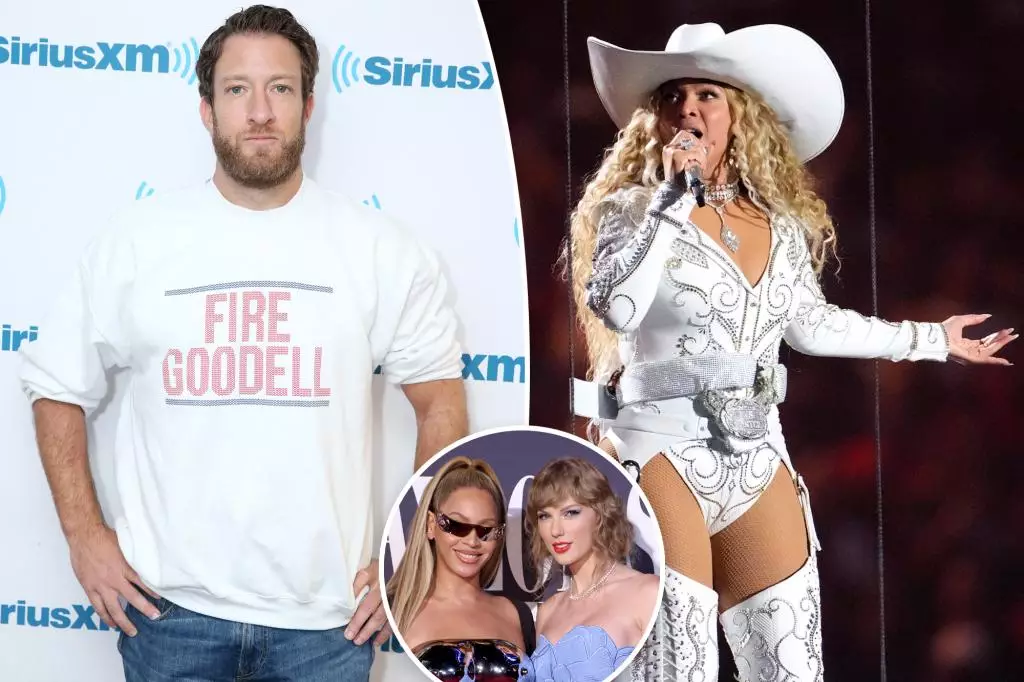In the world of pop music, personal preferences can create fierce loyalty and equally vehement criticism. Recently, Dave Portnoy, founder of Barstool Sports and well-known Taylor Swift enthusiast, did not hesitate to express his discontent with Beyoncé’s halftime performance at an NFL game. His social media post, filled with sarcasm and disdain, claimed, “Beyoncé has been LOST since Destiny’s Child,” suggesting that he believes the pop superstar has failed to maintain her artistic integrity and relevance since her early days. This comment sparked further conversation about how fans often pit artists against one another, creating factions within the music scene.
Portnoy, 47, made his remarks right after Beyoncé, 43, delivered an elaborate and much-anticipated show at NRG Stadium in Houston. Her performance, which featured her riding in on horseback and donning an eye-catching crystal-adorned outfit, laid bare a layer of grandeur that many would argue exemplifies her prowess as a performer. Yet, for Portnoy, it was insufficient to win his admiration. His harsh critique raises questions about what fans really expect from their beloved artists and whether it’s fair to apply such stringent measures based on personal taste.
Beyoncé’s Performance: A Cultural Event
Beyoncé’s halftime performance was crafted to showcase not only her vocal talents but also her ability to meld different musical genres. She performed songs from her country album, “Cowboy Carter,” which included tracks like “16 Carriages” and “Jolene.” The inclusion of various country artists as guests, alongside her daughter Blue Ivy joining her for the finale, aimed to create a multifaceted experience that appealed to a broad audience. By referencing cultural touchstones like the Beatles’ “Blackbird,” she highlighted her versatility and commitment to appealing across genres. However, in Portnoy’s estimation, this effort somehow fell flat.
Critically, when evaluating a performance of this magnitude, it’s vital to consider the challenges inherent in live shows. The intersection of artistry and athleticism—especially when linked to an NFL game—creates an atmosphere that may not cater specifically to every listener’s tastes. For Portnoy, who has consistently shown a preference for Taylor Swift—who embodies a different artistic approach and narrative style—the absence of that specific connection likely colored his reception of Beyoncé’s elaborate spectacle.
The Nature of Fan Rivalries
It’s imperative to recognize that Portnoy’s critique does not exist in a vacuum. Celebrity feuds and fan rivalries have long been a part of pop culture, often capturing public imagination and media attention. The contrasting opinions of fans can lead to heated discussions, with each side feeling an emotional investment in their favorite artists. While Portnoy favored Swift, who many perceive as a more relatable storyteller, Beyoncé’s accolades and impact as a cultural icon create a compelling juxtaposition.
Interestingly, this rivalry is not new. High-profile incidents, such as Kanye West’s infamous disruption of Swift’s VMA acceptance speech, underscore an industry that often sets female artists against one another. Interestingly enough, the Billboard rankings that placed Beyoncé as the No. 1 pop star of the 21st century and Swift just behind her illustrate society’s tendency to create hierarchies between artists. While their styles drastically differ, the debate about who reigns supreme continues to ignite heated conversations.
The debate surrounding Portnoy’s remarks about Beyoncé encapsulates broader themes in the music industry regarding authenticity, performance, and personal preference. In an age where social media allows for immediate commentary, artists are often subjected to instant judgment. For fans like Portnoy, the loyalty to a particular artist—and the ensuing disdain towards others—can fuel divisive discourse about their merits and careers.
As Pop music evolves and artists explore new dimensions, the complexities behind musical appreciation, criticism, and fan loyalty will likely persist. The interests of fans will remain divided, underscoring an essential truth of the entertainment world: that there will always be proponents of different sounds, styles, and iconographies, leading to spirited discussions—and sometimes bitter rivalries—among them. In the end, it’s this diversity of opinion that ultimately enriches the music landscape, leading to more profound conversations and interactions.

